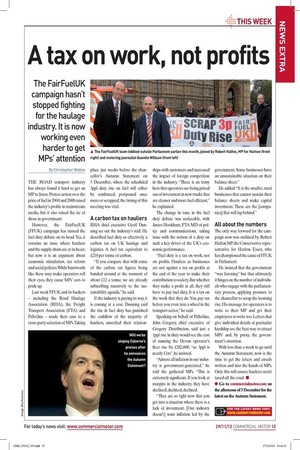A tax on work, not profits
Page 10

If you've noticed an error in this article please click here to report it so we can fix it.
The FairFuelUK campaign hasn’t stopped fighting for the haulage industry. It is now working even harder to get MPs’ attention
By Christopher Walton
THE ROAD transport industry has always found it hard to get an MP to listen. Protest action over the price of fuel in 2000 and 2008 raised the industry’s profile in mainstream media, but it also raised the ire of those in government.
However, the FairFuelUK (FFUK) campaign has turned the fuel duty debate on its head. Yes, it remains an issue where hauliers and the supply chain are at its heart, but now it is an argument about economic stimulation, tax reform and social policies. While buzzwords like these may make operators roll their eyes, they cause MPs’ ears to prick up.
Last week FFUK and its backers – including the Road Haulage Association (RHA), the Freight Transport Association (FTA) and Palletline – made their case to a cross-party selection of MPs. Taking place just weeks before the chancellor’s Autumn Statement on 5 December, where the scheduled 3ppl duty rise on fuel will either be confirmed, postponed once more or scrapped, the timing of this meeting was vital.
A carbon tax on hauliers
RHA chief executive Geoff Dunning set out the industry’s stall. He described fuel duty as effectively a carbon tax on UK haulage and logistics. A fuel tax equivalent to £210 per tonne of carbon.
“If you compare that with some of the carbon tax figures being banded around at the moment of about £12 a tonne, we are already subscribing massively to the sustainability agenda,” he said.
If the industry is paying its way, it is coming at a cost. Dunning said the rise in fuel duty has punished the cashflow of the majority of hauliers, unsettled their relation ships with customers and increased the impact of foreign competition in the industry. “There is an irony here that operators are being priced out of investment in new trucks that are cleaner and more fuel efficient,” he explained.
The change in tone in the fuel duty debate was noticeable, with James Hookham, FTA MD of policy and communications, taking issue with the notion of a duty on such a key driver of the UK’s economic performance.
“Fuel duty is a tax on work, not on profits. Hauliers as businesses are not against a tax on profits at the end of the year to make their contribution to society. But whether they make a profit at all, they still have to pay fuel duty. It is a tax on the work that they do. You pay tax before you even turn a wheel in the transport sector,” he said.
Speaking on behalf of Palletline, John Gregory, chief executive of Gregory Distribution, said just a 1ppl rise in duty would see the cost of running the Devon operator’s fleet rise by £282,000, “so 3ppl is nearly £1m” , he insisted.
“Almost all inflation in our industry is government-generated,” he told the gathered MPs. “This is extremely significant. If you look at margins in the industry, they have declined, declined, declined.
“They are so tight now that you get into a situation where there is a lack of investment. [Our industry doesn’t] want inflation led by the government. Some businesses have an unsustainable situation on their balance sheet.” He added: “It is the smaller, rural businesses that cannot sustain their balance sheets and make capital investment. These are the [companies] that will lag behind.”
All about the numbers
The only way forward for the campaign now was outlined by Robert Halfon MP, the Conservative representative for Harlow, Essex, who has championed the cause of FFUK in Parliament.
He insisted that the government “was listening” but that ultimately it hinges on the number of individuals who engage with the parliamentary process, applying pressure to the chancellor to scrap the looming rise. His message for operators is to write to their MP and get their employees to write too. Letters that give individual details of particular hardship are the best way to attract MPs’ and, by proxy, the government’s attention.
With less than a week to go until the Autumn Statement, now is the time to get the letters and emails written and into the hands of MPs. Only this will ensure hauliers aren’t taxed off the road. n l Go to commercialmotor.com on the afternoon of 5 December for the latest on the Autumn Statement.













































